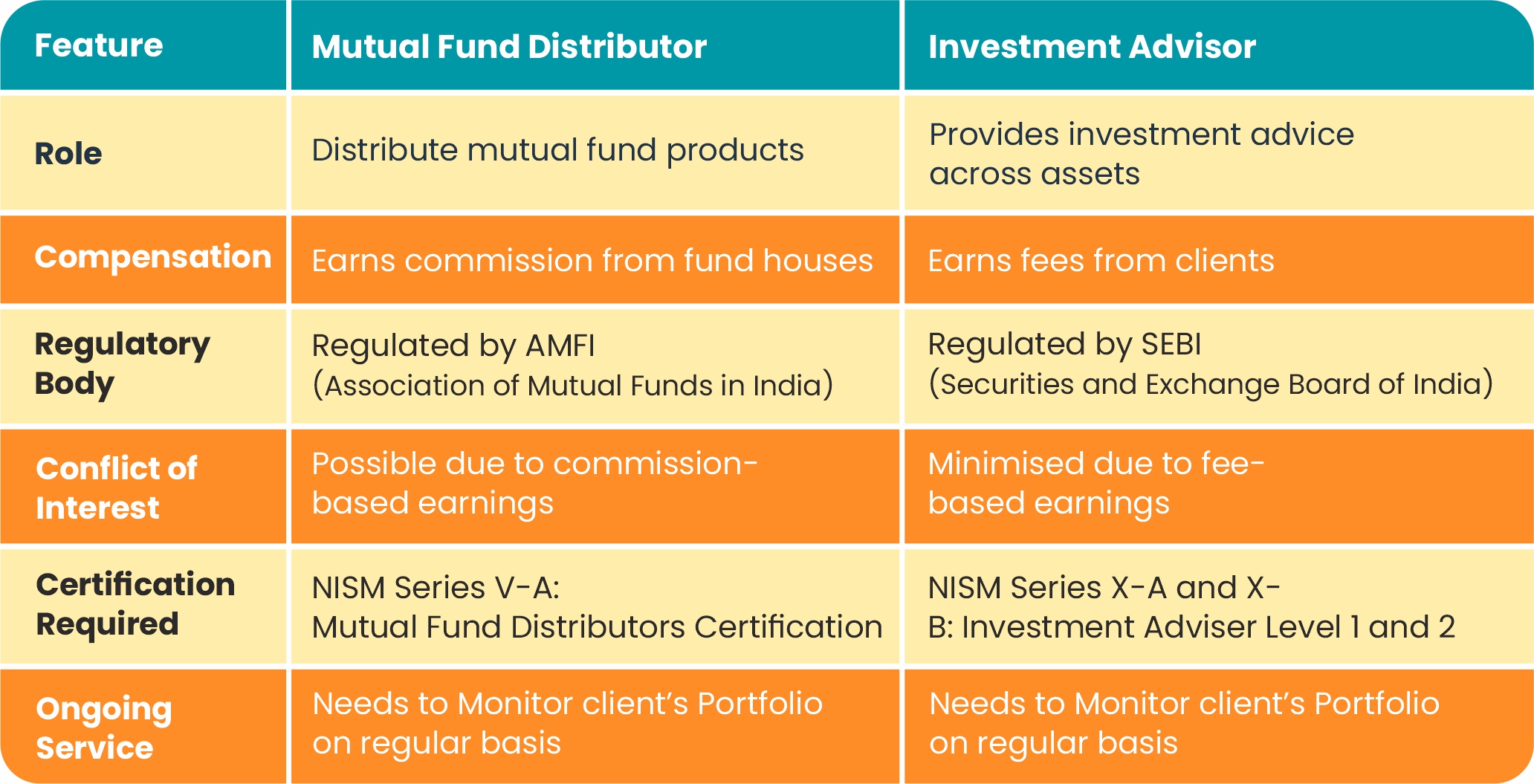Mutual Fund Sahi hai, so is the question “how to become mutual fund distributor”.
As more people see the benefits of mutual funds, they seek professional investment advice. This gives distributors a big chance to grow their client base.
More and more people rely on professionals to make investment decisions. So, the best mutual fund distributors have a big chance to fulfil their client’s goals and can also grow their business.
If you are going to ask yourself how to become mutual fund distributor then you are reading the right blog. Keep reading to understand the procedure for becoming a mutual fund distributor.
A Mutual Fund Distributor is an individual or a company that helps investors with their mutual fund investing journey. This might include helping investors choose the right mutual fund as per their risk tolerance and financial goals.
They might also assist investors in carrying out financial and other transactional operations.
These operations consist of buying and selling mutual fund units, setting up Systematic Investment Plan(SIP) and other regular investing facilities.
Periodically, they also review their investor’s mutual fund portfolios so that their clients can reach their financial goals without any hassles.
To become a mutual fund distributor, you have to meet certain requirements.
It is necessary to get the National Institute of Securities Markets (NISM) V-A, the mutual fund distributor certification exam. It ensures a basic understanding of mutual funds.
The test includes topics such as risk profiling and investing. It also covers KYC regulations and different kinds of mutual funds.
The certificate is valid for three years from the date of clearing the Series-V-A examination. NISM provides study materials and various sources from which you can prepare for the exam.
After passing the NISM test, you need to get an ARN number by registering with the Association of Mutual Funds in India (AMFI).
You must be at least 18 years old. After the process is complete, you will get an unique ARN on your registered email id.
Moreover, you will also receive the welcome kit at your registered postal address. Keep your ARN handy for future reference.
After you get an ARN, you must register with each mutual fund house.
As an alternative, you can also register yourself with a National Distributor such Prudent Corporate instead of registering and empanelling with each mutual fund house. This would make the entire process quite seamless.
Instead of building your software/ research platform or taking a hefty annual subscription from different providers, NDs like Prudent Corporate offer investing platforms such as fundzbazar.com where your investors can view their entire investment in one single dashboard.
NDs also offer regular training, back office support, sales and marketing support and other assistance to their partners in order to become the best mutual fund distributor.
Analyse the client's risk tolerance and financial goals. Identify the best funds for the client's portfolio after analysing their portfolio. Keep an eye on investments and adjust them as needed.
As you start your journey to become a mutual fund distributor, it's essential to familiarise yourself with the market.
Start by researching "mutual fund distributor near me" to find the distributor in your area. This will help you to understand your competitors and the demand of mf distributors in your area.
When it comes to mutual funds, especially SIP investments, you as a distributor are invaluable. The following are the principal role and duties:
As an MF Distributor, it is your role to explain the different types of mutual fund schemes. You can go over the pros and cons of different schemes based on their goals.
Moreover, it is your role to make your prospects and clients aware of investing knowledge such as SIP investments, mutual funds investment and other investing concepts.
You also need to identify which mutual fund schemes are right for your client's financial objectives based on their time horizon and risk tolerance.
For example, you might recommend a higher equity investment for investors in their 20s but lower exposure to equities as they near their retirement.
You can give tailored guidance to your client based on their profile, market circumstances, or fund performance for mutual fund schemes.
Keep an eye on the client's holdings and the market to make sure they're still on track. Monitor and recommend mutual fund schemes and assist clients with adjustments as part of performance tracking.
Keeping everyone in line with SEBI (the Securities and Exchange Board of India) guidelines and standards.
To make sure the procedures are transparent and honest, you have to disclose any potential conflicts of interest.
A MF Distributor has the opportunity to showcase their entrepreneurial side by expanding their clientele and marketing their services to potential investors.
Every client investment that is facilitated by MFDs is awarded a specific commission, usually known as mutual fund distributor commission or mutual fund trail commission.
Distribution businesses provide freedom of working hours. This could be one of many opportunities, especially for those who want flexibility in their careers.
There are many opportunities for continuing education in the growing mutual fund industry.
A range of newsletters and various guidance circulars are provided by AMFI and other regulatory bodies to assist MFDs in staying current with the newest trends and advancements in the MFD sector.
MF distributor and Investment adviser are often clubbed together. But, there are differences which need to be understood. Lets see the differences:

Whether you are an MFD or Investment Advisor, you can partner with Prudent and help your clients get the best investment experience.
For those who have a keen interest in money and investing, this is a rewarding career opportunity.
In this article, we saw the different roles you need to play as a mf distributor. Understanding these roles and having a proper roadmap on how to become a mutual fund distributor can be of immense help in this journey.